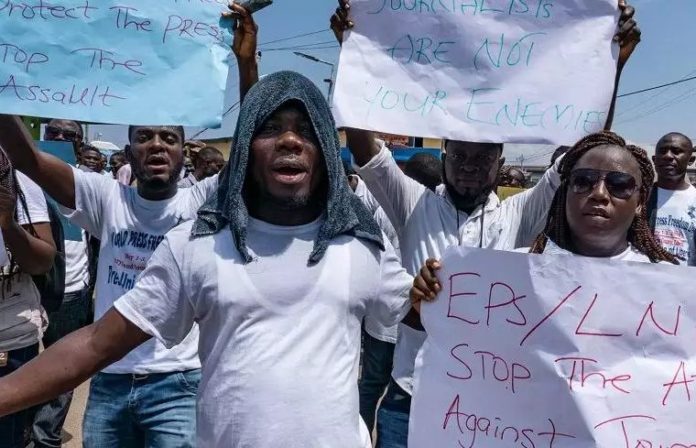By Jonathan Rozen/CPJ senior Africa Researcher
When the coronavirus arrived in Liberia, local journalists knew what it meant to report on a deadly, infectious disease; six years earlier they had donned personal protective equipment (PPE) to report on the Ebola crisis, Musa Kenneh, the Press Union of Liberia’s secretary general, told CPJ.
But this time, Kenneh said, threatening comments from government officials have added more hazard to a dangerous job.
“We are risking our lives moving from place to place, villages, reporting to the people, educating the public about COVID-19…[and] instead of complimenting us for what we’re doing, the government is coming back to fight us,” Kenneh said.
On April 29, Liberia’s solicitor general, Sayma Syrenius Cephus, told local reporters that the government would shut down new outlets and seize equipment from journalists alleged to have disseminated “fake news.” The justification, Cephus told CPJ during two phone interviews in early May, was legally grounded in Liberia’s COVID-19-related state of emergency, which began on April 11 and “suspended” freedom of expression.
“You cannot have 100 percent rights that you may exercise during normal times…Liberia is technically at war [with COVID-19],” Cephus said. The government had so far been “exercising tolerance,” and any shutdown or seizure would require a judicial warrant and could subsequently be challenged in court, he said.
Article 15 of Liberia’s constitution, which CPJ reviewed, protects freedom of expression “save during an emergency” and Article 86 affords presidential power to “suspend or affect certain rights, freedoms and guarantees” when a state of emergency is declared.
“All they [the government] want to do is be discretionary in determining what is false news or not,” Kenneh told CPJ. The press union has “zero tolerance” for false news and views government regulation as a threat to journalistic independence, instead calling for authorities to respect the media’s existing self-regulation processes, Kenneh said.
The same day, April 29, Deputy Information Minister Eugene Fahngon told reporters that existing press passes, which journalists use to move freely amid the lockdown, would be voided and new ones issued, local media reported.
Fahngon’s comments have caused confusion as well as concrete problems for journalists. CPJ spoke to three Liberian journalists who were stopped in Monrovia by security forces this week and told they could not move around without the new pass designated by Fahngon.
One of them, Tetee Karneh, the general manager of the privately owned Spoon FM broadcaster, told CPJ that she had closed her newsroom after she was stopped by police yesterday because she was worried about her staff’s safety.
“I advised my people to stay at home until we can sort this out. I don’t want anyone to be brutalized,” Karneh said, adding that the press pass issues were preventing journalists from delivering information to communities on how to prevent the virus spreading.
Rita Jlogbe, a reporter with the privately owned Sky FM/TV, was stopped on May 4 and Akoi Baysah Jr., the Press Union of Liberia’s assistant secretary general, was stopped on May 5, the two journalists told CPJ. Jlogbe said she had not returned to work after the officer with Liberia’s Executive Protection Service had threatened her for having an “expired pass.”
Today, on a live radio broadcast, Nathaniel McGill, senior presidential minister, warned journalists that they would be “embarrassed” at security checkpoints for not complying with Fahngon’s new pass requirements, Kenneh told CPJ, adding that McGill did not elaborate on his meaning.
CPJ’s calls today to Moses Carter, spokesperson for Liberia national police, and presidential adviser Nathaniel McGill, went unanswered. CPJ exchanged messages with Fahngon on May 6 about a time to speak today, but subsequent messages and calls went unanswered.
Reached by phone today, Trokon Roberts, director of the EPS, told CPJ he was surprised to hear about the incident involving Jlogbe and would follow up with the “people concerned.”
Kenneh told CPJ he remembered how some Liberians didn’t believe that Ebola was real and how journalists worked to inform them; now journalists are trying to play the same role, while taking similar precautions to protect themselves using protective gear like face masks and gloves.
“[But] right now we believe we are not protected with the kind of threats coming from the solicitor general…and deputy information minister, Kenneh said.






















